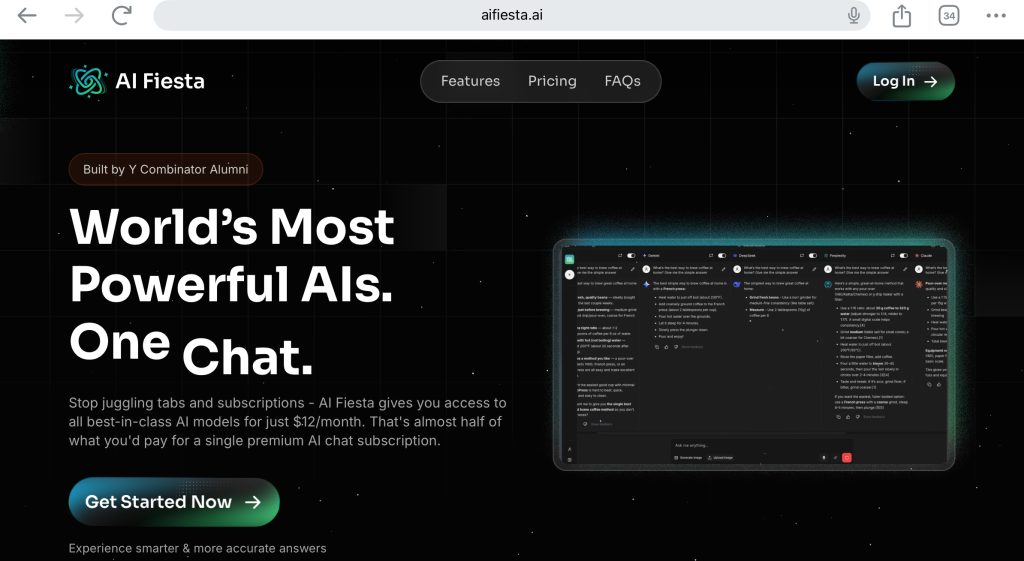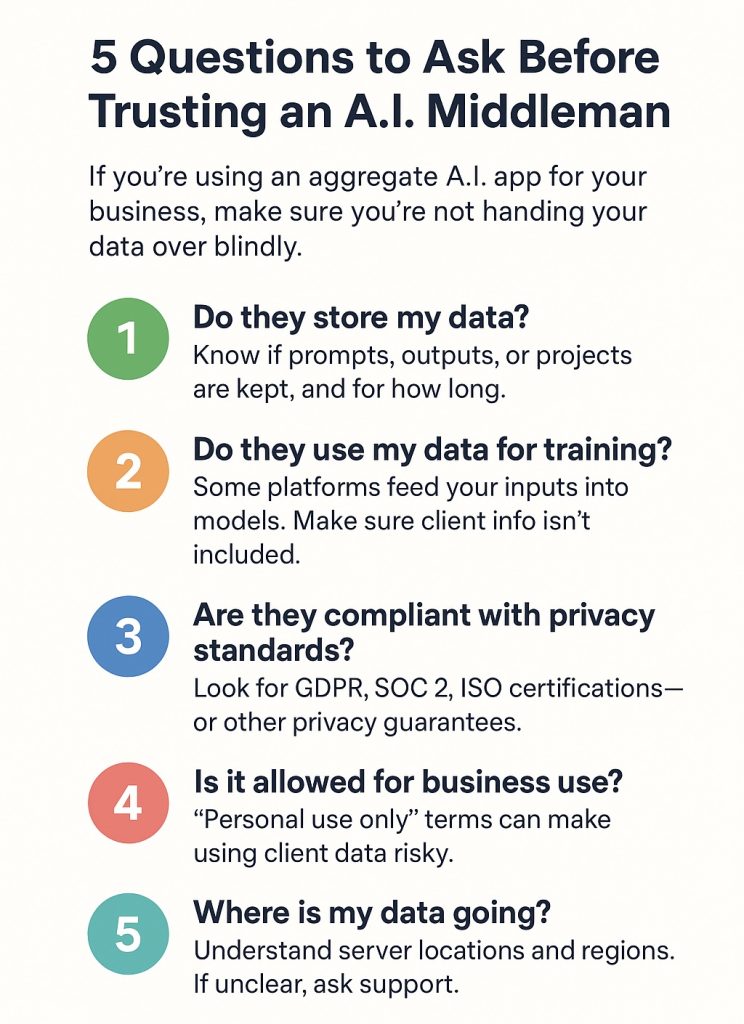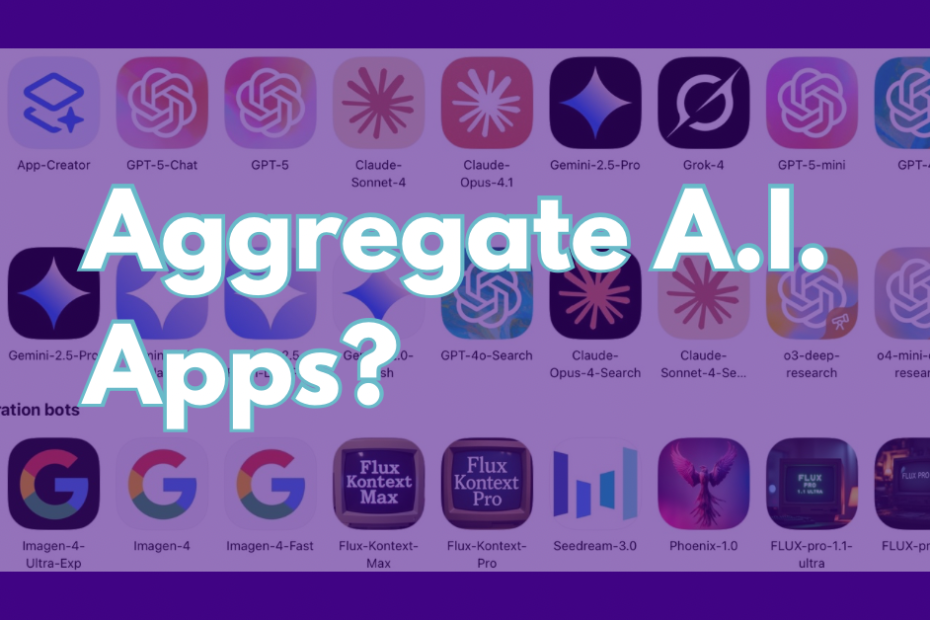The other day someone in a forum asked about aggregate A.I. apps so I thought I’d write a post about this here.
If you haven’t come across them yet, these are apps that bundle multiple A.I. tools into one subscription. Instead of paying separately for ChatGPT, Claude, Gemini and friends, you log into one platform and get access to all of them under the same roof. Examples are Poe, Fiesta and so on.

Think of it like a Netflix of A.I. models.
Sounds brilliant, right? Pay once, get everything. But—as always—there are pros and cons worth knowing before you jump in.
The appeal
- One subscription: No juggling accounts, logins or invoices.
- Compare answers side-by-side: Handy if you want to see how each A.I. tackles the same prompt.
- Convenience: One app, one interface, everything in one place.
- Extras: Some of these platforms throw in tools like image generation, transcription, or pre-made prompts.
The limitations (the bit they don’t lead with in the marketing)
These are the things to think about before deciding whether it’s right for your business:
- Lag time: If OpenAI launches a shiny new “ChatGPT-6”, the official app will get it first. Aggregators usually follow once they’ve tested and integrated it. So when they say “you’ll get new models at no extra cost”, that’s true—but not necessarily right away.
- Missing features: You’ll usually get the basic text model, not the extras. Features like memory, custom GPTs, plugins, or voice? Those tend to stay inside the official app.
- Privacy: You’re going through a middleman. That means trusting their handling of your data, not just the A.I. provider’s.
- Overpaying for what you don’t use: If you mostly stick to one or two models, paying for the whole bundle can be like joining a gym with a rock-climbing wall, swimming pool, and sauna—when all you really wanted was the treadmill.
- Lock-in: Your chats, history and projects live inside their platform. If they raise prices or close down, you’re stuck.
Trusting the middleman with your data
When you use ChatGPT directly, your data goes from you → OpenAI. Same with Claude (you → Anthropic) or Gemini (you → Google). Simple chain.
But with an aggregate A.I. app, the path changes:
You → Middleman app (e.g. A.I. Fiesta, Poe) → A.I. provider.
That means two things:
- The middleman sees everything. They’re handling your input before it’s sent off, and they usually see the replies that come back too. Even if they claim not to “store” prompts, they technically can.
- You’re trusting two companies instead of one. Not only the A.I. provider’s policy on data use, but also the aggregator’s. How long do they keep your chats? Do they anonymise them? Do they use them to “improve their product” (translation: feed it back into training)?
So how do you find out their intent?
- Read the privacy policy. Search for words like retain, share, third parties, training.
- Check terms of service. Some explicitly say “personal use only.” That’s a red flag if you’re using it for client work.
- Look for certifications. GDPR, SOC 2, ISO standards are the minimum signs they take security seriously.
- Email support. A blunt “Do you retain or use our data for training? Where is it stored?” will tell you a lot about how business-ready they are.
- Check their business model. If the app is free or very cheap, ask yourself how they’re covering costs. Often the real product is your data.
For small businesses, this is key: if you wouldn’t happily CC a stranger on your client emails, don’t paste them into a middleman A.I. app without doing your homework.

If any answer is vague or unclear, pause before using the platform for sensitive business tasks.
Promise vs reality
Here’s a good example. One of these platforms says:
“Yes! If ChatGPT releases Model 6 or another A.I. provider launches a higher version, you will get access at no extra cost.”
Sounds like a win. But what it usually means in practice is:
- Yes, you’ll see the newer model appear eventually.
- No, you won’t get it the moment it launches.
- And no, you probably won’t get the fancy add-ons that come with it in the official app.
So it’s not exactly a lie—it’s just the polished version of the truth.
So, should you use an aggregate A.I. app?
If you’re dabbling with A.I., testing prompts, or just want to see which model “thinks” more like you, these aggregate apps are great. You’ll save time and get variety without buying multiple subscriptions.
If you’re using A.I. seriously in your business—writing client-facing copy, automating tasks, or handling sensitive data—stick with the official apps. You’ll get updates sooner, full features, and you’ll know exactly where your data’s going.
If you are interested in a no BS guide for small businesses we created one here.

